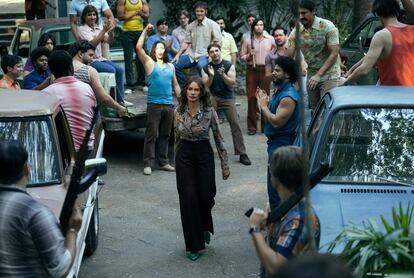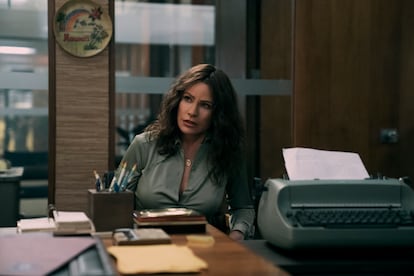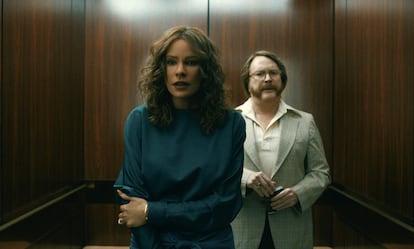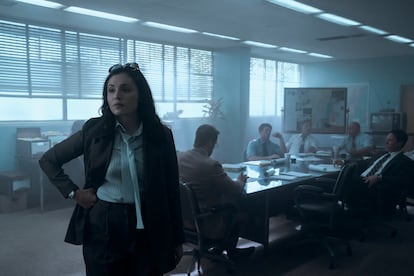‘Griselda,’ Sofía Vergara’s series about a bloodthirsty drug trafficker: ‘It was important to humanize the character; glamorizing her is something else’
The ‘Narcos’ team takes on the life of ‘the queen of cocaine’ in a six-episode Netflix production

Griselda Blanco is credited with more than 250 murders (including those of her two husbands). She was known as the Black Widow or Cocaine Godmother. Between the 1970s and ‘80s, she amassed an enormous fortune trafficking cocaine from Colombia to the United States. She was shot to death in 2012 by two sicarios as she made a purchase in a Medellín butcher shop, after having spent nearly 30 years in a U.S. prison. Her life is part of the dark history of global crime networks, and is now the subject of a six-episode Netflix series that debuts Thursday, January 25. From the team who brought us Narcos, Griselda features Colombian actress Sofía Vergara playing her bloodthirsty countrywoman.
Its director is another Colombian, Andrés Baiz, who describes Griselda as “a story of female empowerment.” “During the six years we spent making Narcos, I never found another woman who achieved the level of success, respect and terror that Griselda achieved. That anomaly was very appealing to me as a storyteller,” says Eric Newman, co-creator and producer of the series, on the pair’s recent visit to Madrid with Vergara, who is the series’ executive producer in addition to playing its lead role. “In all the years of Narcos, we hadn’t established Griselda Blanco as a character, and I think it’s because she needed more than just a line in the Narcos universe. She needed her own universe,” says Newman.
Both men wanted to make it clear that this is a separate project from Narcos, which first centered on Pablo Escobar and continues to follow the story of drug trafficking in Mexico. “Both Griselda and June Hawkins, the cop, who is a real character who nearly no one knows about, had to work and fight 10 times harder to earn respect,” says Baiz. The director also points out differences in tone and other specific aspects of the series: “Narcos had voice-over and archival footage. It’s more documentary, more political, it had a credit title sequence that became emblematic… We didn’t want all that in Griselda. We wanted it to be much more intimate, more focused on the character,” says Baiz.

The series reduces Blanco’s life to less than six hours of plot, a challenge that meant its creators had to make decisions about where to start the story. The action begins the moment in which she flees Colombia with her three children (she’d later have another son). She doesn’t know what has happened, only that she has to escape an abusive relationship. “You can identify with this fleeing woman. She has three kids, no money and a kilo of cocaine. You don’t need to know how she got there, that she has been part of a New York drug trafficking organization, or that she has been a prostitute. We only know that she’s a woman in trouble and the story begins,” says Newman. “If we had begun during her childhood, it would have struck a false note because it would have seemed like we were saying that she is how she is because of that. We preferred that to stay in the subtext,” says Baiz.
One of the debates that comes up every time a new story is made about a real-life criminal focuses on whether these productions glamorize crime and their characters. That’s a question to which the Narcos and Griselda team say they have paid a lot of attention. “For us, it’s important to humanize the character, because these antiheroes are very complex, and delving into those complexities is fundamental. But glamorizing their lives is different. I use a phrase that Orson Welles once said, that having or not having a happy ending depends on where you end the story. You’ve got to see where we end Griselda’s story,” Baiz says. Newman agrees: “To anyone who thinks we are glamorizing or romanticizing the story, my answer is to watch the end of the series. For Griselda, it ends in the worst way possible.”

Both director and producer lauded Vergara’s involvement and commitment, not only in her role as the drug trafficker, but also as executive producer. “There are many kinds of producers. On Narcos, there were 13 executive producers, and some of them I never got to meet,” says Newman. “Sofía was very engaged, she wanted to know what was going on at every level of production, to be a real partner,” he adds. Newman’s biggest concern was the physical and emotional wellbeing of their protagonist. “On Narcos, Wagner Moura was a spectacular Pablo Escobar, but he could work for three days and then rest for a week or more. In this case, giving that it was a more character-focused narrative, she worked almost every day, on very emotional scenes… I was worried about the stress she had to deal with. But she did it with an admirable spirit and resilience.”
For Vergara to embody Blanco, a physical change was required that meant three hours of makeup, and even that she take on a different physicality from her own. “Rather than getting closer to an imitation of Griselda, she wanted to get away from the Sofía we know. That was done through trial and error in order to find the ideal makeup,” Baiz says. “With the makeup and prosthetics, it was very important that they didn’t overwhelm Sofía, that it wasn’t a nose or a chin acting, as we’ve sometimes seen in movies where they go too far, in my opinion,” says Newman. “She had to get rid of Gloria Pritchett [Vergara’s character on the Modern Family series]. We did a lot of tests, we’d sit in my office with the makeup team. If Sofía said that she couldn’t feel her face, or that she looked like the witch from The Wizard of Oz, we’d change everything, and so on, until we got to a good place.”

Drug trafficking is a subject that has been present in their careers on a recurring basis. Baiz did not just direct 22 episodes of Narcos and Narcos: Mexico, he also formed part of Metástasis, the Colombian version of Breaking Bad. Newman focused on the U.S. opiate crisis in the series Painkiller. “I’ve always been fascinated by the business of drugs and the role of the United States as the world’s biggest market for drugs,” says Newman. “With Narcos, we wanted to show that you’ll never be able to deal with a public health crisis like that of drugs by only attacking suppliers, you also have to focus on demand. But doing that requires a kind of self-reflection that I think Americans are incapable of making,” reflects the producer. “Drugs continue to be a huge problem around the world, whether it’s oxycodone, methamphetamines, cocaine, fentanyl or whatever else. It continues to resonate with people,” he says.
Sign up for our weekly newsletter to get more English-language news coverage from EL PAÍS USA Edition
Tu suscripción se está usando en otro dispositivo
¿Quieres añadir otro usuario a tu suscripción?
Si continúas leyendo en este dispositivo, no se podrá leer en el otro.
FlechaTu suscripción se está usando en otro dispositivo y solo puedes acceder a EL PAÍS desde un dispositivo a la vez.
Si quieres compartir tu cuenta, cambia tu suscripción a la modalidad Premium, así podrás añadir otro usuario. Cada uno accederá con su propia cuenta de email, lo que os permitirá personalizar vuestra experiencia en EL PAÍS.
¿Tienes una suscripción de empresa? Accede aquí para contratar más cuentas.
En el caso de no saber quién está usando tu cuenta, te recomendamos cambiar tu contraseña aquí.
Si decides continuar compartiendo tu cuenta, este mensaje se mostrará en tu dispositivo y en el de la otra persona que está usando tu cuenta de forma indefinida, afectando a tu experiencia de lectura. Puedes consultar aquí los términos y condiciones de la suscripción digital.









































